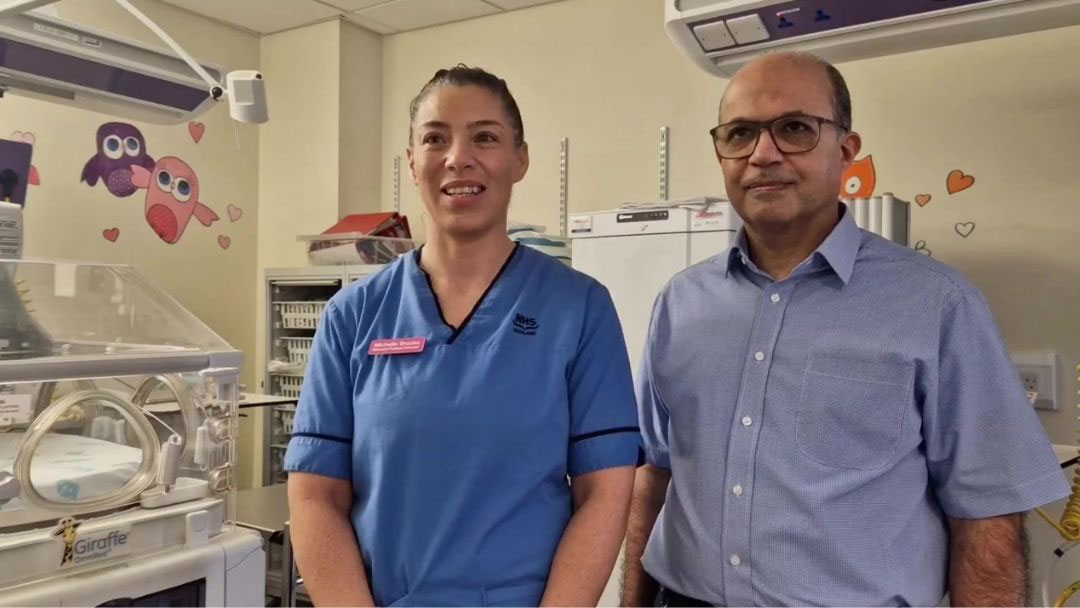Pictured: Michelle Brooks, advanced specialist nurse in neonatal practice education and Mahmoud Montasser, neonatal consultant
Staff from the neonatal team at University Hospital Wishaw have received a Big Shout Out for the excellent care they provide to Lanarkshire’s premature and sick babies.
The unit looks after babies from the age of viability at 22 weeks.
Michelle Brooks, advanced specialist nurse in neonatal practice education, said: “We care for babies as premature as 22 weeks and also get lots of sick term babies as well. We look after them the whole way through their journey and they can be with us for four, five, six months off until around about their due dates.
“So we get close therapeutic relationships with families. It’s a long time to get to know people really well.
“The ultimate goal is for them to be discharged home and we have a discharge bell that the families can ring when they’re leaving.”
The neonatal team have established a number of new projects, which is transforming the way vulnerable babies are cared for on the unit.
Mahmoud Montasser, neonatal consultant, said: “We are very proud of our neuroprotective bundle. We were one of the first units in Scotland and probably across the whole of UK who implemented this bundle. It aims to reduce clinical incidents and severe grades of brain bleeds as these can have really big impact on the future of those babies in terms of their neurodevelopment and milestones.
“Since its implementation we’ve managed to significantly reduce our incidence of severe brain bleeds to one of the lowest across the country.
“It has been an amazing journey by the whole team.”
Michelle added: “We totally changed how we looked after these babies. We had to adopt principles where we nursed them in the midline, so we use special positioners and that helps us keep their head in the midline to eliminate the fluctuations in the cerebral blood flow.
“We tilt the incubators as well as doing multi person care. So before you would just change a nappy lifting their legs, but now you’ll do a straight lift of the baby with the help of another person.
“So one person will lift the baby up, the other will wipe, put a new nappy and change any linen required in that second person, or perhaps third person, depending on how much the baby’s got going on, can be a parent as well. So it allows them more interaction and more contact with their baby than they might have had previously.
“It’s very important that we cluster care to minimise handling. So we want these babies to be in a protected environment in the incubator with the incubator covered and handled minimally. We coordinate all the interventions, so that we can then leave the baby alone for another eight hours where they are fully monitored, resulting in less clinical instability.”
Staff on the neonatal unit recently achieved 100% on a hand hygiene audit, minimising infections for their susceptible patients.
They have also introduced swaddle bathing, which is a developmentally supportive way to bath a baby where they are wrapped in a muslin to keep them warm, contained and secure.
Michelle Brooks said: “We unwrap one limb at a time and wash that limb while the others are still covered. There’s evidence that this method helps maintain temperature, because it’s obviously very important to keep these babies warm.
“It also reduces stress for the baby during the bathing procedure. And parents have said that they find it beneficial for them as they don’t have a slippery naked baby because they’re contained in the muslin.”
The team have also established a massage project, where an occupational therapist massages the babies in advance of any painful or unpleasant procedures. Parents have also been taught how to carry out these massages.
Michelle said: “Our OT Gill will massage the baby herself or support the parents to do it. We take pain scores before, during and after the procedure. The scores have proven that the massage have lower pain scores both during and after the procedure. They return to the baseline state quicker.”
The unit is one of the first in Scotland to adopt neonatal lung ultrasound, to help diagnose specific diseases within the first few hours and days of life.
Mahmoud said: “As well as diagnosing specific diseases early on when babies are unwell in the first few hours and days of life, ultrasound can help us monitor them and update how they are managed as they go along their journey.
“It’s a relatively new thing in the country and we’re proud to be leading the way on that.”
Michelle added: “A big benefit of that as we get lots of full term admissions. And obviously these are babies that should be with their mums.
“We want to limit separation from mums, and identify conditions that can just be monitored on a transitional care unit or a postnatal ward.”
Speaking of his pride in his team and the joy it brings to save a baby’s life, Mahmoud said: “It makes us very proud to make a difference in those babies lives. We can see the appreciation in the parent’s eyes and that’s priceless for us.”
The Big Shout Out praises NHS Lanarkshire teams for taking an innovative, creative and patient-centred approach to working, and recognises the unique contribution staff make to overcoming the challenges faced across the entire healthcare system.



